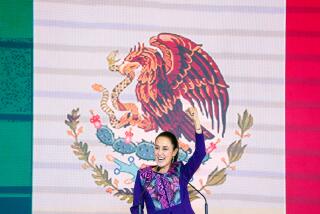Margaret Thatcher, political revolutionary
The closest figure to Margaret Thatcher in British history wasn’t another prime minister. Nor was it even Boudica, the legendary first-century British tribal queen who defied the Romans.
She’s closer to Queen Victoria, a woman in what was regarded as a man’s job, and one who came to know her mind and exercise an iron will.
Margaret Thatcher, Baroness Thatcher of Kesteven, remains Britain’s only female prime minister, but her impact was not as a woman – she was one of those women who tended to pull up the ladder after her – but as a political revolutionary. She wasn’t shy about her criticism. She said she owes “nothing to women’s lib,” and on another occasion, declared that she hated feminism. “It is poison.”
PHOTOS: Margaret Thatcher | 1925 - 2013
It’s a paradox because a good bit of the criticism of her, beyond critiques of her free-market economic policies – which were especially radical for Britain’s welfare state – were gender-based.
French President Francois Mitterand said she had the eyes of Caligula and the mouth of Marilyn Monroe. The nickname “Attila the Hen” got hung on her. And “handbagging” – her critics put that word into the nation’s vocabulary. It means to pummel one’s opponent metaphorically, and it refers to the black bag Thatcher carried as inevitably as the queen carries hers, almost as a prop. One of Thatcher’s biographers, Claire Berlinski, described visiting Thatcher’s papers at Cambridge, and found that the famous handbag smelled like talcum and lily, when she had expected it “to smell like napalm and gun powder.”
It was the British parliamentary system, not a popular vote, that put her in the prime ministership, and it was also her own party members who, 11 years later, while she was out of the country, voted her out of office.
Like the feminists she hated, she was excluded from not only the boys’ club, but she was also cut out of the old Tories’ club. She was decidedly middle class, and many of the fellow party members she deplored as “wet” – the aristocrats and landed gentry, the graduates of Britain’s private schools and members of its private clubs, men who were not aggressively or forcefully conservative enough for her – found her formidable but a little unnerving.
Her onetime press secretary, Bernard Ingham, told me she was “macho” and said that unswerving ideology was a product in part of the fact that other politicians “couldn’t get at her in the Gents” – lobby her in the men’s bathroom.
She could push and bully her colleagues and show them that she could do more work on less sleep than any of them. Ingham told me: “She was absolutely determined to demonstrate that she could beat the men. She worked very late, and had this disconcerting habit at midnight of saying, ‘Oh, you do look very tired, go to bed,’ and one o’clock came, and she’d say, ‘Got your second wind?’
“She was absolutely incapable,” he said, “of realizing how humiliating it was for a man to be hammered by her in the presence of other men. She just didn’t get it … she knew how to deal with the timid. Some people say she was a bully. Well, I think all leaders are a bit of a bully.”
I covered her in early 1991, when she came to California not long after her fall from power, to celebrate the 80th birthday of the man who called her his political “soulmate,” Ronald Reagan. The contrast between the much-honored former president and her own political exile was striking.
The last time I saw her was in 2002. I actually heard her first, that unmistakable voice whose pitch and accents she had polished and shaped as she had her own career. It carried across the nave of St. Paul’s Cathedral, where she had come to celebrate the queen’s golden jubilee.
A dozen years later, her funeral will be held in the same cathedral.
ALSO:
How not to say the wrong thing
What FDR said about Jews in private
More to Read
A cure for the common opinion
Get thought-provoking perspectives with our weekly newsletter.
You may occasionally receive promotional content from the Los Angeles Times.











